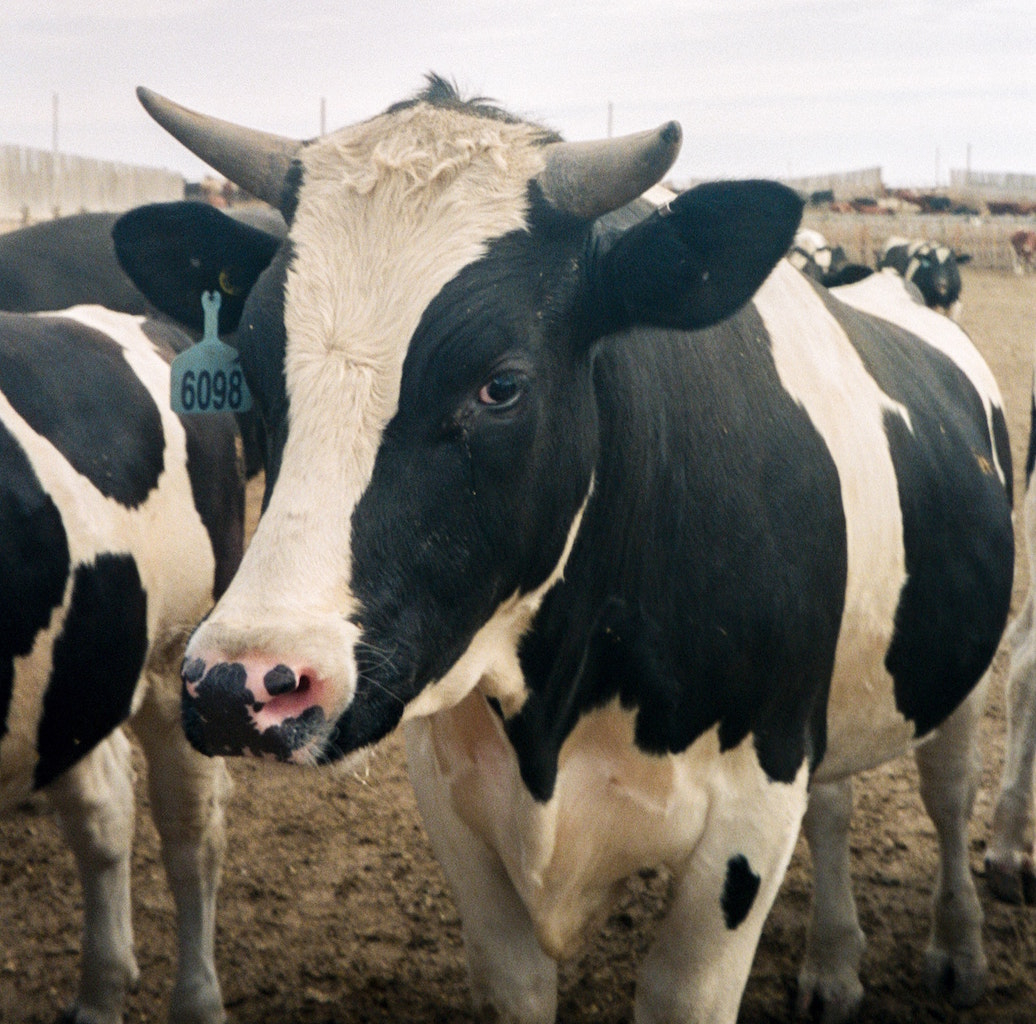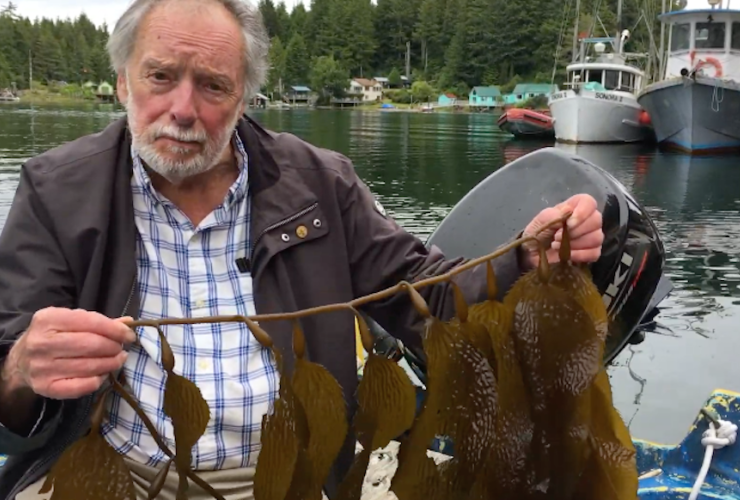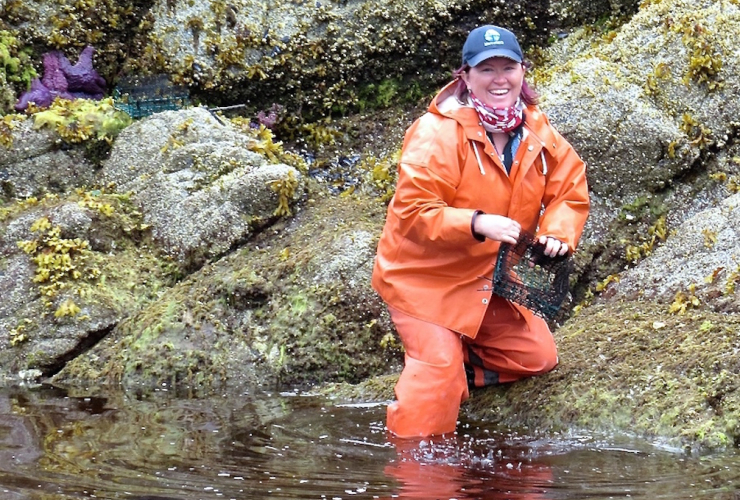Canadian scientists are investigating whether regional seaweeds might be the new superfood for cows, and battle climate change in the process.
Belchy cattle are a big source of methane, a powerful greenhouse gas that traps approximately 80 times more heat than carbon dioxide over 20 years.
Methane makes up about 40 per cent of Canada’s agricultural emissions, with 90 per cent emanating from cattle and sheep.
So scientists are eager to find ways to reduce methane emissions through possible changes to cows’ diets, and seaweed has great potential, said Spencer Serin, a researcher affiliated with North Island College (NIC) and Cascadia Seaweed on Vancouver Island.
Methane is produced in the rumen, or upper stomach, of cattle as they digest their feed. Created during the process of enteric fermentation, as microbes in the cow’s tummy predigest fibre and starches, methane is released as the cattle burp and exhale.

In a single year, a dairy cow can produce methane equivalent to the greenhouse gas emissions from a mid-sized vehicle driven 20,000 kilometres. Typically, there are close to 1.9 million heads of dairy cattle raised in Canada each year.
Scientific research elsewhere in the world has found that certain seaweeds have reduced methane production in live cattle by as much as 80 per cent.
However, Serin said, definitive studies to date involve seaweeds that tend to grow in warmer waters.
So, it’s really important to start examining B.C. seaweeds that are abundant or easily grown and could be beneficial for cattle, he said.
“It’s definitely exciting research to pursue,” Serin said.
“But if we’re talking about improving feed efficiency or decreasing the climate impact of animal husbandry, we can’t be importing seaweed from California, Australia or Hawaii to Alberta or B.C.”
Serin has done some initial research on an invasive seaweed found on the B.C. coast, Mazzaella japonica, which is abundant and easy to source, in co-operation with NIC and a farmer in the Comox Valley who was feeding it to his cows.
Research is ongoing to evaluate anecdotal evidence that the red algae may reduce methane, improve the quality or healthfulness of meat, or improve the digestive process of cattle, he said.
But research opportunities to investigate the more than 500 different species of algae on the West Coast are expanding rapidly as interest in seaweed farming surges, he added.
Serin is collaborating with Cascadia Seaweed to identify good candidates for cultivation, he said.
Cascadia chair Bill Collins said exploring the potential of B.C. seaweeds as feed for cattle is a big focus for the company.
“Seaweed is of significant value in the fight against climate change,” said Collins, adding its possible use in cattle feed has “truly gigantic potential.”
“Every week, we’re seeing another report or newspaper article about the prospect of feeding cattle or cows seaweed,” Collins said.
“If we can deliver seaweed in the volumes necessary, it’s possible we can massively reduce methane emissions from agriculture.”

Agriculture Canada scientist Wade Abbott agreed that seaweed as a cattle feed additive has vast potential, but tapping Canadian seaweeds for the job is still in the early stages.
“Where we're at right now is extremely promising, and it's kind of at a fever pitch of excitement,” said Abbott, “But it’s really in its infancy.”
Abbott, who specializes in how gut flora metabolizes food, has said his focus is largely in determining if a cow can actually digest specific types of seaweed.
There’s a lot of focus on identifying seaweeds to reduce methane, but there’s also great interest in what other sustainable or nutritional benefits seaweed might offer, he said.
“As far as using seaweed as a nutritional component, I think now we can say we know that there are bacteria capable of digesting some of them.”
The next step will be identifying the most promising seaweeds as quickly as possible in a lab situation, using artificial rumens, before trialing them with live animals, Abbott said.
Given how quickly some seaweeds grow, and the fact they don’t require water or fertilizer, they could offer sustainability benefits over traditional land crops. And Canada has the advantage of having three coasts to grow it on.
“It’s also the classic feed versus food debate,” Abbott added. “Where the land required to grow feed could have been used to feed people.”
But cattle farmers on the Prairies are likely going to be resistant about using seaweed from the coasts in lieu of traditional feeds growing in the immediate vicinity, he added, unless nutritional benefits can be demonstrated.
“We can consider it potentially as an alternative form of feed in the future, but we also still have to weigh all the positives and negatives as it relates to climate change and sustainability,” Abbott said.
“So we just have to temper our claims until the science catches up.”
Rochelle Baker / Local Journalism Initiative / Canada’s National Observer
This article (and the methane
This article (and the methane fact check) perpetuates the historic misconception of the impact of enteric fermentation on climate change. This misconception was corrected by revising the calculation of greenhouse warming potential from GWP to GWP*: https://www.oxfordmartin.ox.ac.uk/publications/climate-metrics-for-rumin...
In essence a stable population of ruminants does NOT contribute to global warming because their new methane emissions are offset by their twelve-year-old methane emissions converting into CO2. This largely nullifies the impact of livestock on greenhouse warming potential but does not materially change the impact of the oil and gas industry.
Incorporating the new science reduces the root problem to immateriality.
That's all fine and dandy,
That's all fine and dandy, but first, I don't think the population of cattle has been stable, I strongly suspect it has been growing at a fairly fast pace. The human population has been growing, and significant portions have been increasing their meat intake by quite a bit, eg the growing middle class in China.
And second, that would still mean if cows emitted less methane, less methane would be emitted. If you want to call that an offset instead of reducing a climate change driver, whatever, but less methane is less methane.
Agricultural methane and its
Agricultural methane and its role as a greenhouse gas
https://www.tabledebates.org/building-blocks/agricultural-methane-and-it...
Methane and the sustainability of ruminant livestock
https://www.tabledebates.org/building-blocks/methane-and-sustainability-...
"In short, the big picture conclusion from the last decade’s research on dietary sustainability does not change. At current numbers and as currently produced, livestock, including but not only ruminant livestock, are and continue to be important contributors to the problem of climate change and to other environmental harms. Even if the methane emissions associated with their on-going consumption do not result in additional warming, high consuming countries and individuals occupy a disproportionately large climatic space. Reduced consumption of livestock products by these high consumers, as well as development and adoption of measures to reduce emissions from livestock production, could allow for global livestock production at potentially sustainable levels."
If methane produced by cows
If methane produced by cows "converts," that's part of its breakdown process. Methane is methane. By this logic, methane from fossil fuels isn't a problem either: after all, it eventually breaks down into CO2 ... but wait a minute: isn't CO2 a huge problem, in and of itself??? Huh? Huh? Huh?
Of course methane emissions *increase* global warming, when they occur. And for years afterward. That doesn't mean that the current amounts are OK. I fear there's been a misread of the piece. Neither would I completely trust an academic presentation that can't construct a simple briefing without misplaced bullets: it bespeaks carelessness.
What I'd like to see is someone studying the impact on methane production if cattle feed no longer contained cow poo, and calf formulas no longer contained bovine blood components. Do you know why calf (cow baby formulas) are needed? Because some at least of the cattle bred for milk production have altered freshening (coming in of milk) schedules, such that there's nothing from their mothers for calves to feed upon until after they'd die of starvation if that was all they had to depend on.
I wonder if cows would recognize whole seaweed as a foodstuff.
Also, given the amount of belching one notices on TV amongst (especially male) broadcasters, one wonders what seaweed in their diets might do to reduce human methane: not to mention the amount of readily discernible public farting amongst humans, again according to my personally observation -- which doesn't come with claims of equivalency to bean-counted science -- more predominant amongst males of the species.
This is truly encouraging,
This is truly encouraging, exciting news. As an ecologist-elder, I would like to ask that the research also address how seaweed in livestock feed would contribute, or not, to better manure for soil enhancement. Also to be considered are the ecological and economic effects of seaweed harvesting in our coastal ecosystems.






Comments